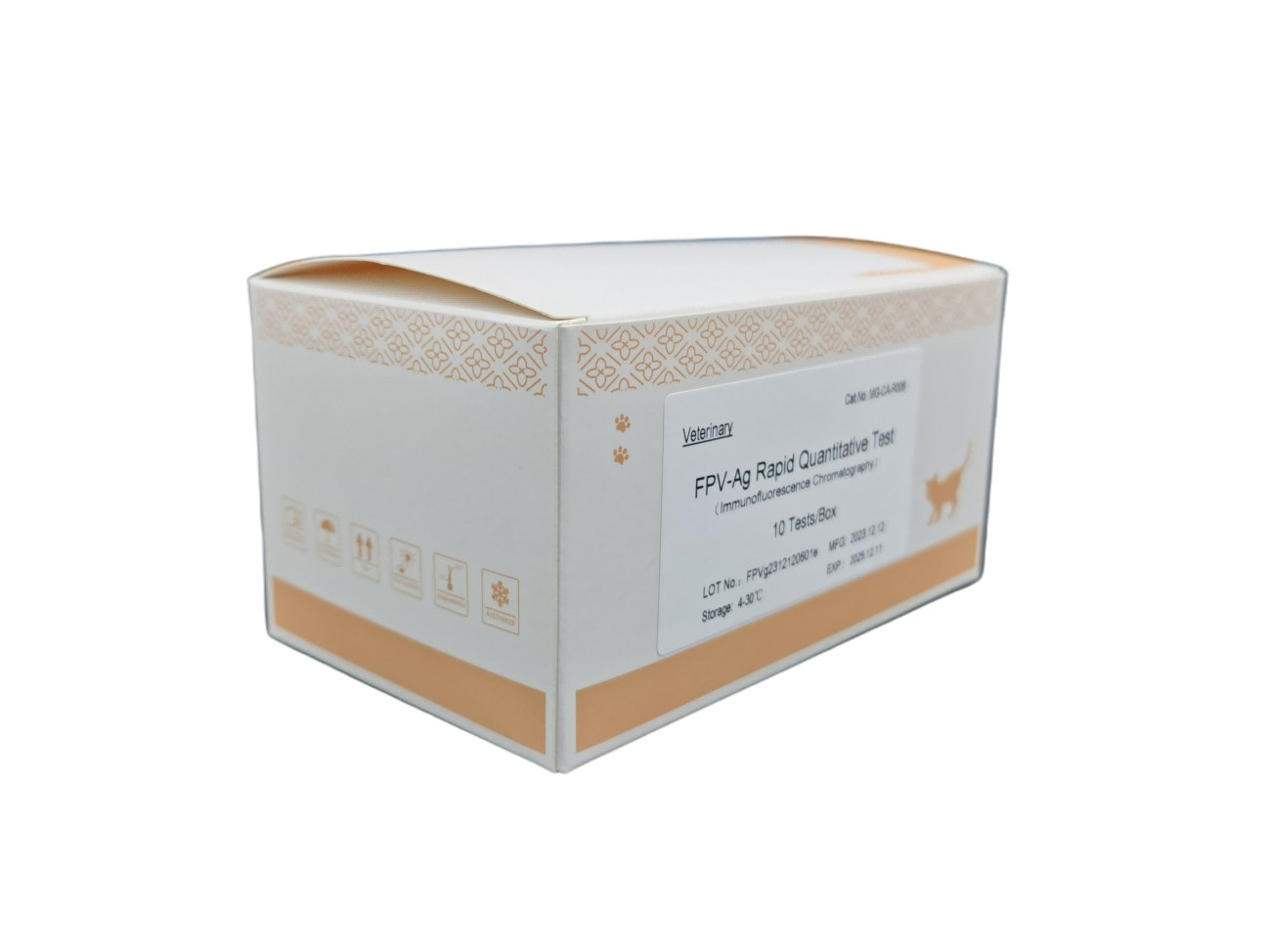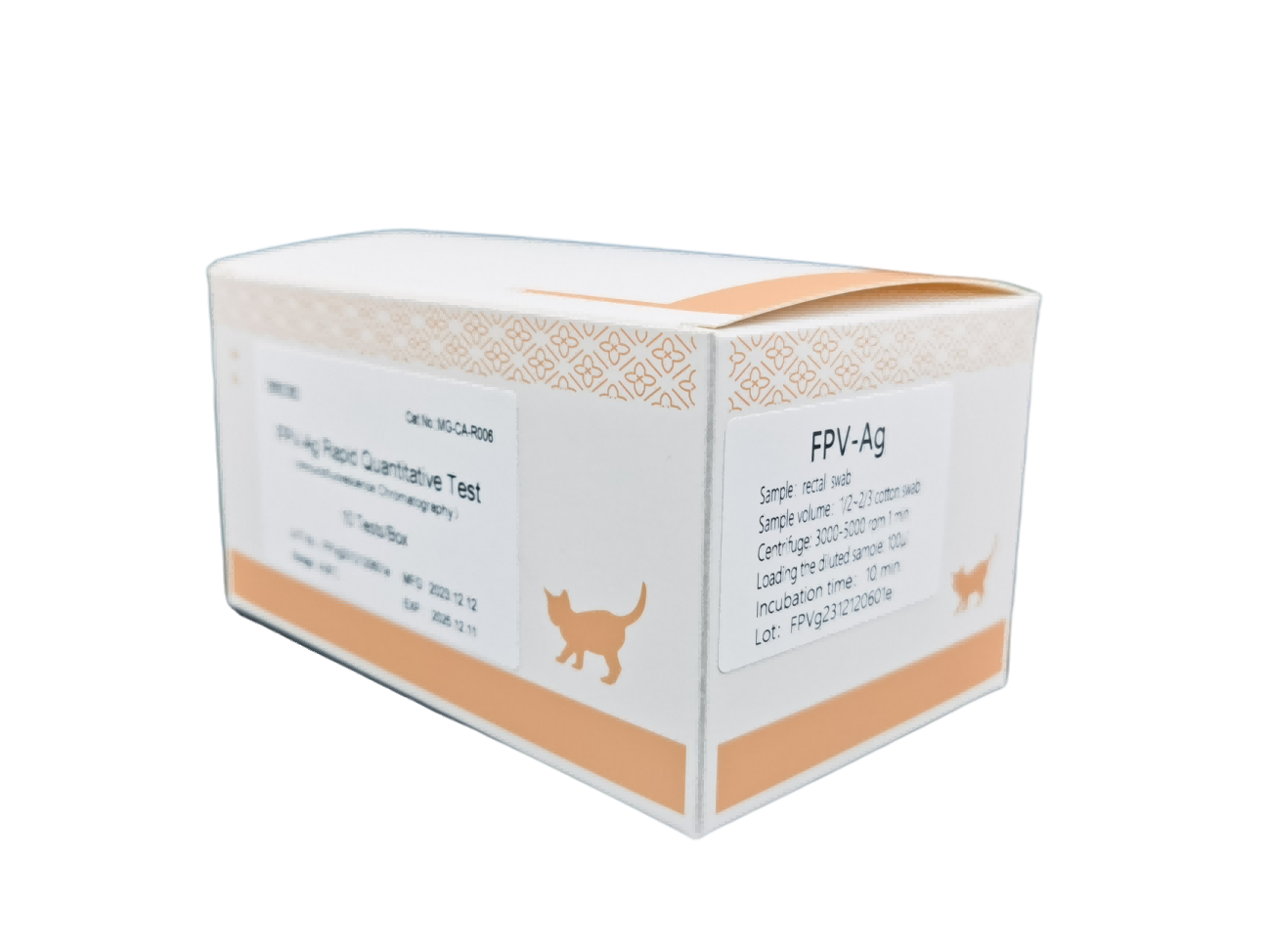


Key attributes

SPECIFICATIONS
10 Tests/Box
Cat.No.: MG-CA-R012
The FHV-Ab test is a fluorescence immunoassay designed for use with an Immunofluorescence Analyzer to quantitatively determine panleukopenia virus antibody concentrations in serum or plasma. This test is useful for assessing the FHV-Ab titer level after pet vaccination, indicating if revaccination is necessary. It also aids in diagnosing and monitoring feline panleukopenia virus infection.
For in vitro diagnostic use only. For professional use only.
This test utilizes a quantitative double antigen sandwich fluorescence immunoassay technique. The intensity of the fluorescent signal correlates with the amount of FHV-Ab captured, with the concentration expressed in Tu/ml.
Individual Sealed Pouches: 10 (Each containing a Test Device and a Desiccant Pouch)
ID Chip: 1
Instructions for Use: 1
FHV-Ab Sample Buffer Tubes: 10
Pipette Tips: 10
Immunofluorescence Analyzer
Timer
Pipette
Centrifuge
Store the test kit at 4–30°C until the expiration date.
Perform the test at 18–28°C after opening the Test Device.
Once the pouch is opened, complete the test within 30 minutes.
The test can be performed using serum or plasma.
Serum/Plasma Preparation: Separate serum or plasma (preferably with EDTA anticoagulant) from blood within 3 hours of collection. If the specimen is severely hemolyzed, a new specimen should be obtained.
Ideally, the test should be performed immediately after specimen collection. If testing cannot be completed within 3 hours, store the specimen at 2–8°C for up to 72 hours. For long-term storage, specimens should be kept below -20°C.
Preparation for Testing:
Bring all materials to room temperature before use.
Thaw and mix frozen specimens thoroughly prior to testing.
Avoid repeated freezing and thawing of specimens.
Use only clear, non-hemolyzed specimens.
Refer to the Immunofluorescence Analyzer Operation Manual for detailed instructions.
Place the Test Device on a clean, level surface.
Insert the ID Chip into the meter and click "Read ID Chip." Ensure that the Test Device lot number matches the ID Chip number.
Pipette 20 μl of the prepared sample into the FHV-Ab Sample Buffer and mix gently. Avoid vigorous agitation and foaming.
Pipette 100 μl of the mixed sample into the sample well (S) of the Test Device, ensuring no bubbles form.
Test Modes:
Standard Test: Click "Standard Test," insert the Test Device into the meter holder immediately after adding the sample, and click "Start Test." Select "Serum/Plasma" as the sample type. The meter will automatically countdown and display the result.
Quick Test: Click "Quick Test," start the timer immediately after adding the sample mixture, and leave the Test Device at room temperature (18–28°C) for 10 minutes. Then insert the Test Device into the meter holder and click "Start Test." Select "Serum/Plasma" as the sample type. The instrument will automatically scan and display the result.
Results are displayed on the main screen and can be printed automatically or manually by clicking "Print."
Each FHV-Ab Rapid Quantitative Test includes an internal control for routine quality control. This internal control is conducted with each patient sample. If the internal control fails, the meter will display an error message, indicating that the test should be repeated.
Reference Range for FHV-Ab in Feline Serum or Plasma:
Detection Range: 5.0–640 Tu/ml
| Level | Result (Tu/ml) | Interpretation |
|---|---|---|
| 0 | ≤ 10 | No antibody protection; vaccination recommended. |
| 1 | 10–15 | Weak antibody protection; supplementary immunization or adjustment advised. |
| 2 | 15–45 | Weak antibody protection; supplementary immunization or adjustment advised. |
| 3 | 45–100 | Moderate antibody protection; monitor antibody levels every 6 months. |
| 4 | 100–150 | Moderate antibody protection; monitor antibody levels every 6 months. |
| 5 | > 150 | Strong antibody protection; test annually to ensure timely vaccine protection. |
Note: If the pet has not been vaccinated but the test result shows a level above 1, it may indicate a past infection.
Each laboratory should establish a reference range representative of the population being evaluated.
This kit is for in vitro diagnostic use only.
Inspect packaging and labels before use. Do not use if the pouch is damaged or if the vial appears compromised.
Do not use the Test Device beyond the expiration date.
Use a new pipette tip for each specimen to avoid contamination.
Technical or procedural errors, as well as unlisted substances in specimens, may interfere with the test and result in erroneous outcomes.
